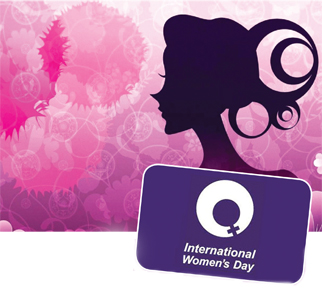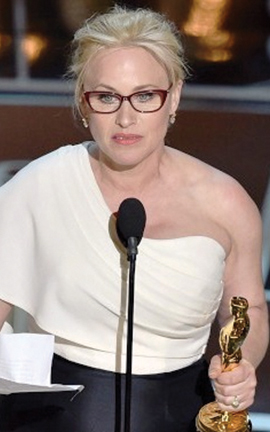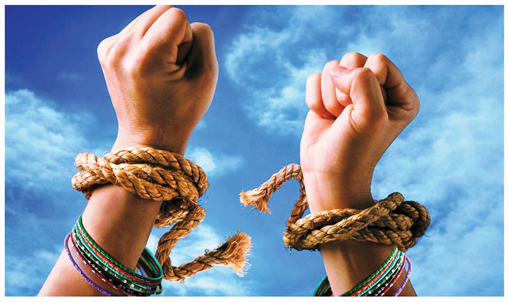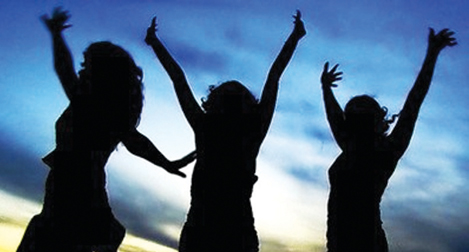|
 Today is International Women's Day: Today is International Women's Day:
Empowerment and equality
By Indunil Thenuwara
One of the most news-worthy moments at this year's Academy Awards,
which took place on February 22 at the Dolby Theatre in Hollywood, Los
Angeles was the acceptance speech made by Best Supporting Actress
Patricia Arquette.
The star who won the Oscar for her role in the movie Boyhood,
accepted her award with an inspiring speech on women's rights and
equality.
After thanking a long list of people, she ended her speech on a
powerful note, "To every woman who gave birth to every taxpayer and
citizen of this nation, we have fought for everybody else's equal
rights. It's our time to have wage equality once and for all and equal
rights for women in the United States of America."
Her comments were met with loud applause from other prominent women
in the audience such as Meryl Streep, who happened to be a fellow
nominee for the award with Arquette, and Jennifer Lopez, and cast the
spotlight once again on the wage disparity between men and women in the
US movie industry.
Equal pay has been a controversial subject in Hollywood and the rest
of America (and indeed the rest of the world) for a long time. The
recently leaked emails from Sony Pictures further revealed the gender
inequality which exists in the entertainment industry.
|

Patricia Arquette giving the acceptance speech |
It was revealed that the male stars of the movie American Hustle -
Christian Bale and Bradley Cooper - were paid nine percent of the
profits of the movie, while the female stars - Amy Adams and Jennifer
Lawrence (despite being some of the most bankable A-listers and the
latter also an Oscar Best Actress winner) - received only seven percent
of the profits.
Disparity
The hacking of emails opened a can of worms, relating to the wide
gender disparity in wages. Of the 17 Sony employees who earned more than
one millions dollars a year, only one was a woman.
It was also revealed that Michael de Luca, Co-president of Columbia
Pictures, earned almost one million dollars more than his female
counterpart Hannah Minghella. In 2005, 85 of the top 100 earners at Sony
Pictures were men.
The average American female employee, it is believed, was paid 78
percent of what men were paid in 2013.
Arquette's speech has created a buzz on social-media platforms around
the topic of income disparity, drawing attention to this major issue
related to gender discrimination, not just in the US, but across the
world.
The gender pay gap is a reality worldwide despite this being the 21st
Century.
Even in the European Union, which has made some of the most
progressive steps with regard to women's empowerment, women on average
earn around 16 percent less per hour than men.
In highly industrialised Germany, the figure is said to be 20
percent. This, despite women doing better at school and university than
men! The wage gap results in women earning less over their lifetimes,
leading to lower pensions and a risk of poverty in old age.
One may also remember that it was as recently as 2007 that the All
England Club, which hosts the premier tennis tournament, the Wimbledon
Championship, decided to pay equal prize money to the men's and women's
champions.
Negotiation
In Sri Lanka, the gender pay gap may not be a big issue in the public
sector as salaries are based on job categories and employment grades,
but in the private sector where salaries are determined through a
process of negotiation, the gap still exists.
It's especially prevalent in the bottom end of the wage spectrum -
unskilled labour such as in the agriculture, estate and construction
sectors.
A study carried out by a team from the University of Peradeniya a few
years ago had revealed that the wage gap at the bottom level could be as
high 33 percent in the private sector and 27 percent in the public
sector.
At the top end of the spectrum, the gap was narrower in the public
sector at five-six percent, but still high in the private sector, at
around 20 percent.
The salary disparity, however, is just one form of discrimination
against women whom Mao Tse-tung famously described as "holding up half
the sky". Women also have to tackle physical, psychological and verbal
abuse, sexual and other forms of harassment and violence including rape
and even death and disability at the hands of men among a host of other
discriminatory practices.
 Despite advances made in the right direction, women's immense
contribution to the national economies of the world, to social and
cultural development, to science, technology and art, to life itself, is
not fully recognised and appreciated. Despite advances made in the right direction, women's immense
contribution to the national economies of the world, to social and
cultural development, to science, technology and art, to life itself, is
not fully recognised and appreciated.
A gaping chasm remains between legal equality and individuals'
behaviour and attitudes and there really is no place on Earth where men
and women truly enjoy equal rights, privileges and opportunities.
However, this is not a situation which should continue to be
tolerated in the 21st Century.
If women are equally educated, qualified, smart and capable as men,
why should they settle for less? In the civilised world, it is a shame
that one half of humanity is allowed to control and dominate the other
half.
Equality
As we celebrate International Women's Day on March 8 (today), the
message of equality for all should ring loud and clear. According to UN
Women, "the Day is a time to reflect on progress made, to call for
change and to celebrate acts of courage and determination by ordinary
women who have played an extraordinary role in the history of their
countries and communities".
To this end, the theme for this year's event is 'Empowering Women,
Empowering Humanity: Picture it!' which was the clarion call of the UN
Women's Beijing+20 campaign. The Day will focus on the 20th anniversary
of the Beijing Declaration and Platform for Action, where 189 government
leaders gathered in the Chinese capital in 1995 to sign the landmark
roadmap setting the agenda for realising women's rights.
The most comprehensive global agreement on women's empowerment and
gender equality focuses on 12 critical areas and envisions a world where
each woman and girl can exercise her choices, such as participating in
politics, getting an education, having an income, and living in
societies free from violence and discrimination.
Although much progress has been made since then, there is still a
long way to go and the 20th anniversary of the conference provides a
fresh opportunity to galvanise political will, reconnect and mobilise
the public towards reaching this goal. While celebrating the
achievements made in ensuring gender equal laws and practices, the event
will also re-address the gaps that remain.
From March 9-20, the 59th Commission on the Status of Women will
review global implementation of the Beijing Platform for Action and take
stock of where women stand in the world today.
Over 1,100 Non-Governmental Organisations and 8,600 representatives
have registered to participate in the session. About 200 side-events
hosted by governments and UN agencies including a march for gender
equality and women's rights as well as about 450 parallel events by
civil society would take place. It is expected that these events would
generate momentum and urgency for global actions on women's rights and
gender equality.
Submissive
History has shown that countries and societies where women hold high
positions have grown and developed over others where women remain
submissive. As UN Women Executive Director Phumzile Mlambo-Ngcuka had
said in her message for the launch of the Beijing+20 campaign last year,
"countries with higher levels of gender equality have higher economic
growth.
 Companies with more women on their boards have higher returns to
shareholders. Parliaments with more women consider a broader range of
issues and adopt more legislation on health, education,
anti-discrimination, and child support. Peace agreements forged by
female and male negotiators last longer and are more stable. Companies with more women on their boards have higher returns to
shareholders. Parliaments with more women consider a broader range of
issues and adopt more legislation on health, education,
anti-discrimination, and child support. Peace agreements forged by
female and male negotiators last longer and are more stable.
"Studies show that for every one additional year of education for
women, child mortality decreases by 9.5 percent.
Equalising access to resources and services for women farmers would
boost output and eliminate hunger for 150 million people.
A billion women will enter the world economy in the next decade.
With equal opportunities, their impact on our future prosperity will
be a global game-changer."
As part of her message for International Women's Day 2015 which falls
today, Mlambo-Ngcuka called on countries to "step it up" for gender
equality, with substantive progress by 2020 to achieve the aim of
reaching 'Planet 50:50' before 2030. She said the trajectory of progress
has been sluggish which means a girl child born today would have to wait
80 years before she sees an equal world. Speedier action is called for
in this regard, she said.
This is the message that should reverberate around the world, not
just today, but every day of the year.
As Patricia Arquette remarked while accepting her Academy Award,
"It's our time to have wage equality once and for all and equal rights
for women".
|

